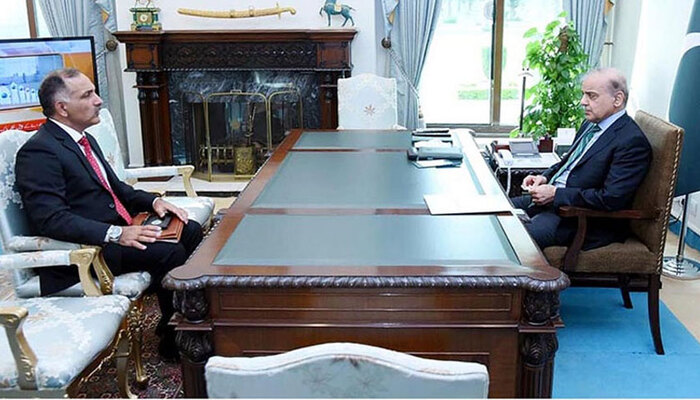Flood preparedness has become Pakistan’s top priority as Prime Minister Shehbaz Sharif directed the National Disaster Management Authority (NDMA) to complete all rescue and relief arrangements in advance. The keyword flood preparedness dominated the premier’s message, reflecting urgent concerns over rising water levels in the Ravi, Chenab, and Sutlej rivers.
Prime Minister’s Call from Beijing
Issuing directives from Beijing, the prime minister spoke to NDMA Chairman Lieutenant General Inam Haider Malik. He emphasized the need for proactive measures as rivers swelled due to recent monsoon rains. The premier insisted that early action was critical to protect lives and property before conditions worsen.
During the call, Shehbaz Sharif highlighted that floods often strike with little warning. He directed the NDMA to act in collaboration with provincial governments and local administrations to ensure swift response.
Warning for Ravi, Chenab, and Sutlej
The prime minister ordered that citizens must be kept fully informed about the situation in the Ravi, Chenab, and Sutlej rivers. He pointed out that timely warnings are vital for preventing loss of life.
Shehbaz Sharif also noted that communities living near riverbanks often face the greatest risk. For this reason, he stressed that evacuation plans and safe shelters must be prepared in advance.
NDMA’s Briefing on Current Situation
NDMA Chairman Malik briefed the prime minister about the existing flood situation. He explained that water levels in the three rivers continue to rise steadily due to heavy upstream rainfall. Malik also provided updates on ongoing relief operations in vulnerable districts.
He assured the premier that the NDMA had mobilized resources, coordinated with provincial disaster management authorities, and prepared emergency stockpiles of food, medicine, and tents.
Collaboration with Provinces
The premier directed the NDMA to intensify coordination with provincial governments. He underlined that provinces must play an active role in monitoring, evacuations, and providing relief.
Shehbaz Sharif said joint efforts would be the key to reducing the scale of disaster. He emphasized that the federal and provincial administrations must remain in close communication to ensure resources reach the most vulnerable areas quickly.
Read: Quetta Suicide Blast Kills 15 at BNP Rally
Importance of Public Awareness
The prime minister stressed that public awareness campaigns must be launched immediately. Communities should receive timely alerts about potential river overflows and evacuation routes.
He noted that misinformation during disasters creates panic and hampers relief work. Therefore, communication through reliable sources such as government media, local mosques, and mobile alerts was declared essential.
Protecting Lives and Livelihoods
Flood preparedness, according to the premier, goes beyond immediate relief. He directed the NDMA to protect both lives and livelihoods. Crops, livestock, and rural infrastructure must also be safeguarded to minimize long-term damage.
Shehbaz Sharif explained that floods not only displace people but also destroy farmland, cut off transport routes, and create food shortages. He said comprehensive measures must address both immediate rescue and long-term recovery.
Role of Technology in Disaster Management
The premier encouraged the use of modern technology in flood monitoring. He said satellite imaging, weather forecasting, and digital communication tools should be employed to predict river flows more accurately.
He directed NDMA to work with the Meteorological Department and international agencies for real-time data. This, he said, would improve planning and reduce the margin of error in forecasts.
Learning from Past Disasters
Shehbaz Sharif reminded officials of past flood disasters that caused massive losses. He urged NDMA to learn from those experiences and build stronger mechanisms.
He said weak embankments, delayed evacuations, and poor coordination had previously worsened crises. This time, he warned, negligence would not be tolerated.
Ensuring Adequate Resources
The NDMA chairman assured the prime minister that relief supplies such as tents, blankets, medicines, and food items were already stockpiled. He added that army units and rescue teams were on standby for rapid deployment.
The premier directed that these resources be transported closer to high-risk areas to cut response times. He stressed that equipment like boats, generators, and mobile clinics must also be ready for use.
International Cooperation
Shehbaz Sharif said Pakistan would also welcome assistance from international partners if the situation worsens. He noted that climate change has intensified rainfall patterns, increasing the threat of severe flooding in South Asia.
He called on global institutions to support Pakistan with expertise, funds, and technical tools to improve disaster response capacity.
Focus on Long-Term Resilience
While immediate measures remained the priority, the prime minister also highlighted the need for long-term resilience. He directed NDMA to work with planning bodies to strengthen river embankments, improve drainage systems, and relocate vulnerable settlements.
He added that flood preparedness should be part of national development strategies. Only through resilient infrastructure and disaster-smart policies can Pakistan reduce repeated losses, he said.
Follow us on Instagram, YouTube, Facebook,, X and TikTok for latest updates
